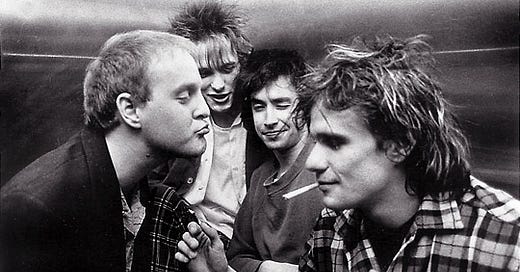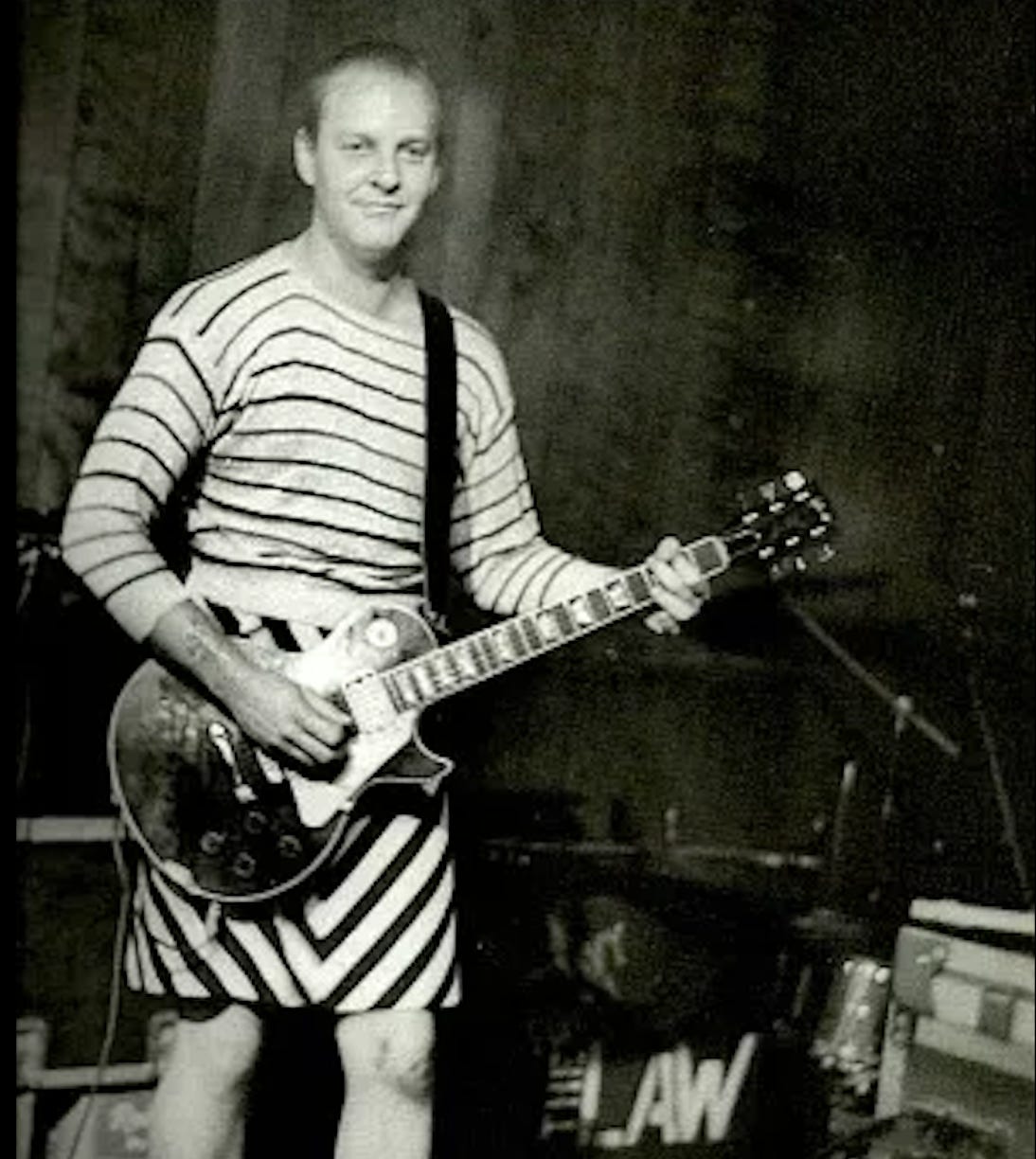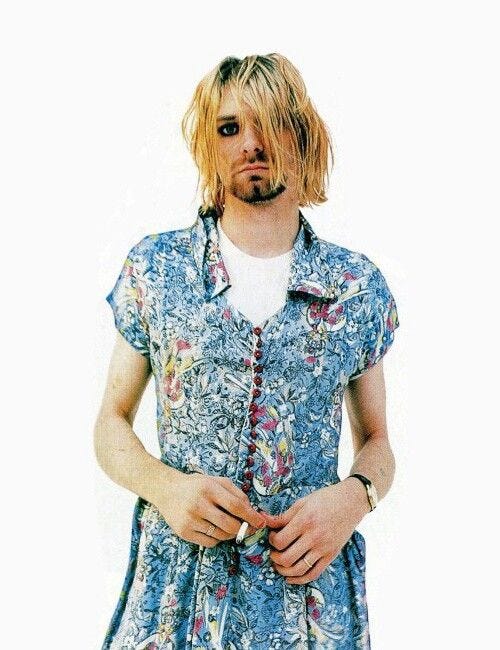A prescient song about suffocating gender roles came from a seemingly unlikely source.
Queer artists Miley Cyrus, Joan Jett, and Laura Jane Grace collaborated in 2015 on a benefit for the Happy Hippie Foundation, which is Cyrus’ nonprofit that provides services to unhoused LGBTQ+ youth. The musicians gathered at her Gainesville home to record a few tracks, including “Androgynous,” a song depicting a future when suffocating gender roles are obsolete.
Here comes Dick, he's wearing a skirt
Here comes Jane, you know she's sporting a chain
Same hair revolution, same build evolution
Tomorrow who's gonna fuss
And they love each other so
Androgynous
Closer than you know, love each other so
Androgynous
The song’s message felt very on-brand coming from a group of queer artists in 2015—but the song isn’t from 2015. It isn’t even from this century. What makes “Androgynous” profound is that it was written in 1984 by a cisgender, heterosexual former janitor from the Midwest.
Not that androgyny was a new concept in 1984. Glam rockers like Lou Reed and David Bowie had long made it the centerpiece of their identities in the ‘70s, and with the rise of disco and new wave, gender-bending had become a prerequisite of rock star behavior because it was edgy and a rebellious influence on suburban teenagers. But while musicians got street cred for wearing makeup and rhinestones on stage, in the real world it could earn you a serious ass-kicking.
That’s what made the lyrics to “Androgynous,” written by Paul Westerberg of the Replacements, so revolutionary. Westerberg looked more like the guy who’d dole out an alleyway ass-whooping rather than penning an unironic and heartfelt love letter to gender nonconformity. In fact, he addresses bullying in the lyrics and predicts that the limiting gender associations of “kewpie dolls” and “urine stalls” will one day seem utterly ridiculous in a future when people like “Dick” and "Jane” seem as normal as anyone else.
Mirror image, see no damage
See no evil at all
Kewpie dolls and urine stalls
Will be laughed at the way you're laughed at now
The Replacements are not what most people would call a queer band, in that not one member of the band identifies themselves on the LGBTQ+ spectrum. But considering the more straightforward (pun intended) definition of “queer,” which means to subvert the conventions of normalcy, the Replacements are textbook queer. Set against the backdrop of 1980s, the Replacements provided an unflinching antidote to Reagan-era conservatism filled with yuppies, greed, blind ambition, and homophobia.
Guitarist Bob Stinson often wore dresses onstage, and the band’s blue-collar angst took aim at the music industry fame machine – with members refusing to appear in videos, devolving industry showcases into drunken spectacles, and feuding with executives and producers. “Bastards of Young” perfectly sums up the band’s untameable image, distaste for corporate greed, and penchant for self-sabotage.
God what a mess
On the ladder of success
You take one step
And miss the whole first rung
The band’s third album, Let It Be, references teenage sexual confusion and how restrictive gender roles add to the frustration.
In ”Sixteen Blue,” Westerberg writes:
A girl and a woman, a boy and a man
Everything's sexually vague
Now you're wondering to yourself if you might be gay
Your age is the hardest age
Everything drags and drags
One day, baby
Maybe help you through
There’s also the gritty scream anthem “We’re Coming Out,” which doesn’t directly address themes of sexuality but when placed alongside “Androgynous” and “Sixteen Blue,” the song’s title alone seems rife with subtext.
Writer Ryan Reft wrote this in his essay “Rethinking the Replacements” for Tropics of Meta:
“One needs to remember President Reagan’s role in the AIDS epidemic and the rising consciousness of gay and transgender communities, why do so many ignore this aspect of the band? Probably, because it fails to conform to the myth that has grown around the Mats; talking about nervous heterosexuality rather than nervous homosexuality remains a more accessible way in for many people and fans. Bob Stinson frequently donned dresses for live performances, but no one ever presents it as his comment on gender or sexuality, usually ascribing this idiosyncrasy to Bob’s drinking or drug use. So the Replacements, a band that definitely grasped irony, failed to see the irony of a band featuring a male guitarist wearing a dress playing songs with titles like ‘We’re Coming Out’ and ‘Androgynous’ in Reagan America? Unlikely.”
The inspiration for "Androgynous" sprang from a drunken night out between Westerberg and R.E.M. guitarist Peter Buck. The pair decided it would be a laugh to don dresses and gaudy makeup and hit the bars. In the resulting tense altercation with the locals, Westerberg was called “androgynous” among other things. Westerberg had never heard the term and had to later look it up. The encounter spawned a new vocabulary word and inspired a gorgeous ballad about tolerance and acceptance.
Let It Be didn't chart, but it was more successful than the band's previous releases and a leap forward artistically. It received critical acclaim from indie music insiders, but, despite the album's success, a rift was forming in the band. Westerberg had taken greater control of songwriting, and the label brought in outside musicians. R.E.M.’s Peter Buck played the guitar solo on “I Will Dare” in place of Replacements co-founder Bob Stinson. These choices eventually broke the band apart.
But their legacy as rabble-rousers with heart would inspire a generation of rockers who carried the torch. It’s easy to spot the influence the Replacements had on bands like Green Day and Nirvana. Green Day singer Billie Joe Armstrong would pen his own ode to androgyny in 1997’s “King For a Day.”
Sugar and spice and everything nice wasn't made for only girls
GI Joe in panty hose
Is making room for the one and only
King for a day, princess by dawn
King for a day in a leather thong
King for a day, princess by dawn
Just wait 'til all the guys get a load of me
And Nirvana’s Kurt Cobain would also appear onstage wearing a dress as a statement against toxic masculinity. Cobain wrote the song “In Bloom” to send a message to fans who might’ve jumped onto the Nirvana bandwagon without first understanding what the band stood for politically. In the music video, the band wears baby-doll dresses before smashing the stage to smithereens.
He's the one
Who likes all our pretty songs
And he likes to sing along
And he likes to shoot his gun
But he knows not what it means
Knows not what it means
The influence of the Replacements continues to inspire musicians today. Trans rocker and former lead singer of Against Me! Laura Jane Grace cited “Androgynous” as an inspiration for her concept album, Transgender Dysphoria Blues, centered around being a transgender woman in a world that openly resents her.
In an interview with Louder, Grace said, “I don’t think I really discovered the Replacements until I was about 17 or 18 years old, and ‘Androgynous’ was the first song I heard by them that absolutely floored me. Dealing internally with gender dysphoria at the time, I so strongly identified with it and felt like Paul Westerberg must surely be transgender.”
“Androgynous” may have been adopted as a queer anthem by artists like Joan Jett, Laura Jane Grace, and Ezra Furhman, but the song’s lasting potency comes from being written by someone who spent one night walking in the shoes of queer people, then penned a deeply loving, sympathetic statement about love beyond the binary. If only more people could get it as right as Paul Westerberg. Then we’d already be living in that future he sings about, seeing no damage, no evil at all.









Fantastic piece, Jami. I remember hearing “Androgynous” back when it came out and relating to it, even as a straight white boy. It spoke to anyone (like me) who felt they didn’t belong to any group, and showed how such binary labels are confining and imprisoning. Love how you much you pack into every essay without it ever seeming dense or busy.
I had heard many Replacements songs on the college radio station I listened to in high school, and I knew the name Paul Westerberg, who had a solo album that was big when I was a teenager (I guess around the time of the movie Singles?) but I don't think I made any connection. But I do know the first, oh, 8000 times I listened to "Androgynous," it was the 1991 Crash Test Dummies version. I didn't even know it was a cover until a few years later. I am trying to not feel embarrassed about that now -- I actually listened to that CTD album for the first time since 1993 just last week, and I really enjoyed it. But the original Replacements version of "Androgynous" has been my go-to for 25 years. I don't think it's hyperbole to say it's one of my all-time favorite songs. "Future outcasts and they don't last," is such a pithy and gentle way to put bigots and 'phobes in their place -- it hits 'em right in the [lack of] intellect.